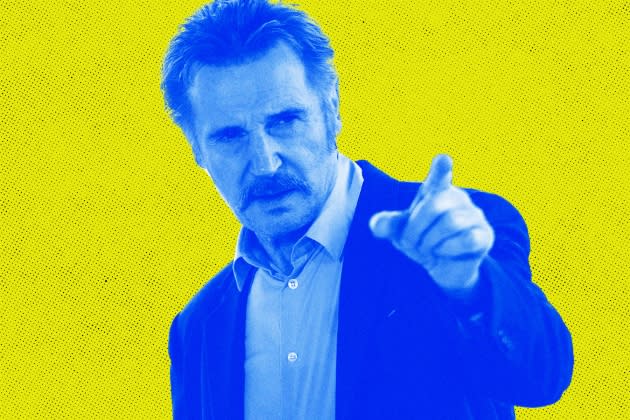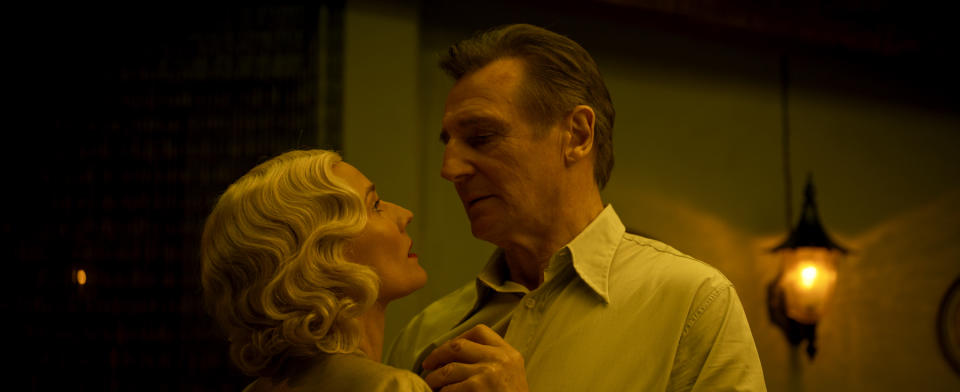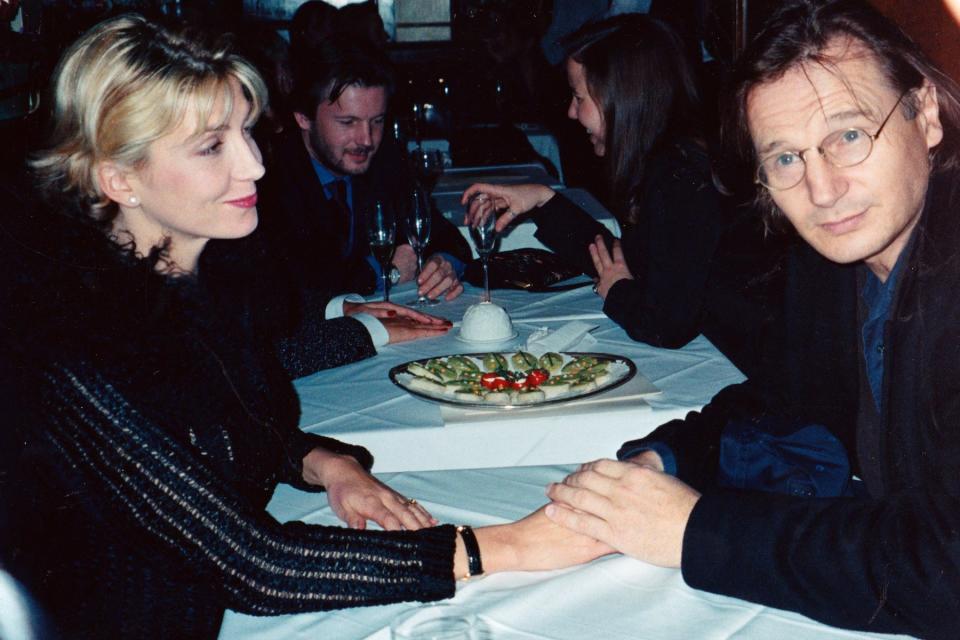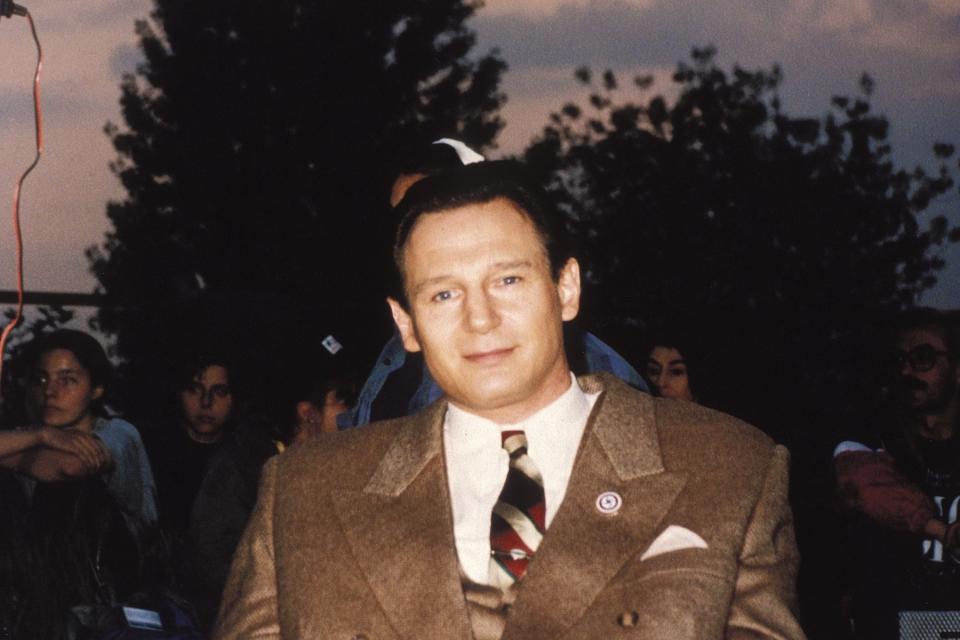Liam Neeson Has Some Regrets

Let’s first address the obvious: My name is Marlow, and I am interviewing Liam Neeson for his new film Marlowe, the latest spin on Raymond Chandler’s hard-boiled detective Philip Marlowe.
“Interesting that your name is Marlow!” exclaims Neeson at the start of our chat.
More from Rolling Stone
On the Rowdy Set of the 'Party Down' Revival With Paul Rudd, Adam Scott and More
'The Flash' Trailer: Michael Keaton's Batman Returns, Ezra Miller Causes More Mayhem
'Swarm' Takes Stanning to the Extreme in Teaser for New Series From Donald Glover
I inform the veteran actor that I’m in fact named after the protagonist of Heart of Darkness, not the femme fatale-swerving character played by everyone from Humphrey Bogart and Robert Mitchum to Elliot Gould and now him.
After expressing his displeasure with the 1993 TV movie version of Conrad’s novella, starring Tim Roth and John Malkovich (“its heart wasn’t… dark enough”), we move on to Marlowe. In Neil Jordan’s latest, Marlowe (Neeson) is a private eye in 1939 Los Angeles who’s hired by a fetching heiress (Diane Kruger) to find her former lover (François Arnaud), who’s mysteriously disappeared. The investigation takes Marlowe deep into the dark heart of Hollywood, a cesspool filled with drugs, rape, and murder. Jessica Lange, Alan Cumming, and Danny Huston are along for the ride.
Neeson, who is 70, was candid during our wide-ranging chat that touched on everything from how he can’t stand all the superhero movies these days to the passing of his lovely and talented wife, Natasha Richardson.
What is it about film noir that you enjoy? And did you have favorites growing up?
You know something? About three weeks ago, I went through them. I’ve got this Criterion Channel on TV, and they had a film noir series. I thought, OK, I’ve got to see which ones I remember. I watched ten, and I’d say about six of them I remembered. They were always on during Sunday afternoons in our living room, growing up in the north of Ireland. There was a guy with his collar turned up, a trilby hat on, and it was raining. So, I feel I’ve grown up with film noir — watching them with my dad and not quite following the story, but always intrigued by them.

Your detective investigates the underbelly of Hollywood in Marlowe. What are your thoughts on “the industry?” I understand you have a place in upstate New York and don’t live in Los Angeles.
Yeah, I live away from it. But I lived in LA for three and a half years. We’ve all heard the stories of Hollywood in the ‘30s and ‘40s — heads of studios, tales of actors like Elizabeth Taylor and Mickey Rooney being fed drugs so they can be “peppy” and ready for the next day’s work. The casting couch, of course. We’ve all heard those stories. I never got involved in that. To me, it was just always a business. There were executives that I met at these pre-screening parties, and we had nothing in common. Not all of them. But the whole business aspect of it I just leave to my agents.
The “femme fatale” is a common trope in film noir. Have you ever been lured in by a femme fatale and taken on a wild journey?
Many times. God. Many times. I’m so many years of age… I was happily married for fifteen years, but before that? Of course. Loved every second of it! [Laughs]
I did watch your recent appearance on The View, which seemed totally chaotic through no fault of your own.
I was in the dressing room drinking a cup of tea, turned the TV up, and I thought, oh, this will be great. They’re talking about gun violence in America, and I agree that it’s an American problem. I go onstage and join the ladies during the break, and I was congratulating them on this discussion. And then our segment starts and it’s just all this BS with Joy [Behar] and Liam Neeson and having a crush, and I’ve known Whoopi for years and Joy a little bit, but I just wasn’t impressed. I’m uncomfortable in those situations, you know? One of the ladies [Sunny Hostin] is a prosecutor and we had a little chat afterward and it was a good, intelligent conversation, but then the segment’s all about this — oof —thirteen, fourteen-year-old crush. It’s just a bit embarrassing.
Taken came out fifteen years ago. I’m curious how you feel about this action-star phase of your career? Do you ever feel burdened or trapped by it?
Well, if I had a penny for every time somebody mentioned “a certain set of skills.” I’m always like, Oh fuck, here we go again. I remember when we were shooting that scene, I begged Pierre Morel, “Please, can we cut this back? This is so corny. I feel I’ve seen this and heard this in so many movies. I’m gonna kill you. I’m gonna torture you. Can we cut this whole ‘I have a certain set of skills’ and all that?” But Pierre was like, “Trust me — it’s going to work.” I’ve always thought this was a straight-to-video film, but was very surprised when Fox cleverly cut a trailer, showed it at big sporting events, and it became successful when it was released. Again, I was a little embarrassed. I felt my fight scenes were very good. We’d worked hard on those with the stunt guys, and I’ve always enjoyed that kind of stuff.
And because of the popularity of Taken, you became this huge action star. You still occasionally do stuff like Marlowe, but you’ve mostly been doing action stuff since then.
Marlowe is my 100th film, and in the oeuvre of my career, a few of them have been action-jackson ones — the Taken franchise and a couple of others. I just hate the idea of a “phase” of a career. I even hate the idea of my career being a “career.” I’ve been so fucking lucky. Really lucky. I’ve gotten to work with Steven Spielberg. This is my fourth movie with Neil [Jordan]. I’ve worked with some really classic guys. That being said, “career,” “phases,” and all that stuff? Sometimes I’ll speak to my agent, and he’ll say, “Oh, did you read that action script?” And I say, “Yup, I think it’s quite good.” And he’ll say, “So, should we move ahead and say you’re keen to do it?” And I say, “They do know I’m 70, right?” And he’ll say, “Yes, they know your real age.” And I say, “OK! That’s all I want to know.”
I had read that you turned down the role of James Bond in GoldenEye because at the time you weren’t interested in being a big action star.
I was not offered James Bond. I know the Broccolis. They looked at a bunch of actors. Schindler’s List had come out and Barbara [Broccoli] had called me a couple of times to ask if I was interested, and I said, “Yes, I would be interested.” And then my lovely wife [Natasha Richardson], god rest her soul, said to me while we were shooting Nell down in the Carolinas, “Liam, I want to tell you something: If you play James Bond, we’re not getting married.” So I would tease her by going behind her back, making my fingers as though I’m holding a gun, and then [hums the James Bond theme]. I loved doing that shit! [Laughs]

She gave you a James Bond ultimatum.
She gave me a James Bond ultimatum. And she meant it! Come on, there’s all those gorgeous girls in various countries getting into bed and getting out of bed. I’m sure a lot of her decision-making was based on that! [Laughs]
You were in Darkman back in 1990 and then appeared in Batman Begins, so you were ahead of the curve as far as superhero movies go. How do you feel about their ubiquity these days?
I’ll be honest: All these superhero movies? I’m not a fan. I’m really not. I admire them because it’s Hollywood with all their bells and whistles and technology, which is phenomenal, but they all seem to me to be just the same story. You can say, OK, you did do Chris Nolan’s.
Those were different. They had film noir elements, among other things.
You took the words right out of my mouth. They had a noir feel to them. And Chris Bale and Gary Oldman? Come on! What a cast. And Michael [Caine] and Morgan [Freeman]? My god!
What a cast. You know, The Princess Bride was one of my favorite films as a kid and I read that you auditioned for the role of Fezzik. Is that right?
I was out in LA with my then-English agent and she said, “Oh, this film’s going to happen, this part’s a giant, and the director is coming to London to meet actors.” So I’m back in London and going to meet Rob Reiner at a hotel. I went up, knocked on the door, and Rob was behind a desk with the casting director. He looked at me, looked at her, looked at me, looked at her, and shouted, “I need a giant! What height are you?” I said, “Six-foot-four.” And he goes, “I need a giant! You’re not a giant!” He never even said hello. I’m going to run into Rob Reiner one of these days and I’m going to tell him, “You were very rude, Mr. Reiner. Very rude.” Anyway, he got the right guy.
Listen, six-foot-four is gigantic by Hollywood standards. Most of these guys are like five-foot-five.
[Laughs] It was a lovely film, wasn’t it?
Really lovely film. I wanted to ask you about that story you shared a few years back at a press junket concerning an unfortunate episode that happened in your past—
—Seriously, Marlow, I’m just not. I explained it all. I’m just not going there. I’m sorry.
You addressed it in an episode of Atlanta. Can you talk about how that cameo came about?
Terrific series. Donald [Glover] had called me. I’d never met Donald before but knew who he was and admired him very much. I’d seen a couple of episodes of Atlanta and he called me, and he said, “Look, I’d like you to do this.” I said, “You’ve got to be kidding me. There’s no way I want to churn that up again. I can’t. It really is a painful memory for many reasons.” And he called me back a couple of times and said, “Trust me. Please.” He was working on [Mr. & Mrs. Smith] with the lovely Phoebe Waller-Bridge, and she had said, “Look, this is cool. You should do this.” And I thought, “Maybe I should? Fuck it. I trust Donald. He knows the Black community.” And Donald said, “Look, we got you. You’re a good guy.” So, push came to shove, and I did it. And I’m glad I did. For me, Brian Tyree Henry is a great, great actor. I unfortunately had no scenes with him in Widows, but it was fantastic to work one-on-one with him.
I thought Widows wasn’t marketed correctly. It was sold as this prestige awards-bait film when in reality it was, in my opinion, a really stellar studio action film with broad appeal.
I see. Yeah, it was a good movie. I was miscast, I have to say. I mean that a thousand percent. I hadn’t seen it before the Toronto Film Festival and most of my interviews were with Viola Davis, and I’m so glad I didn’t see the film because I wouldn’t have been there. I really believe I was miscast. I did not like my acting at all. I love the film. Viola, Brian, and all the girls were terrific in that.

This year marks the 30th anniversary of Schindler’s List. I read a funny story about how you think you got the role because you were backstage after a Broadway performance and Steven Spielberg, his wife Kate Capshaw and her mother came to say their congratulations and you hugged her mother — while semi-nude.
Anna Christie. Oh yeah. With Natasha [Richardson]. Steven told me that. And he worked with me for a few hours, just us together, and I prepared a couple of Schindler scenes. I was in this ‘40s suit. And he kept giving me notes, going, “Try it this way” and “Try it that way.” And I left thinking, “Well, if I don’t get this, I’ve just spent three hours with one of the world’s great directors.” And push came to shove, and it was great to do, too. He is a fabulous director. Though there’s a part of me that still feels he should have cast Jack Thompson in the part.
I think you’re being too hard on yourself. You knocked that one out of the park.
Oh, I don’t know. There’s a part of me that doesn’t think so. I don’t know. It’s complex. But it’s an extraordinary piece of work.
Anna Christie turned out to be quite a big deal for you. You reconnected with your eventual wife, Natasha Richardson, and were cast in Schindler’s List.
I’d been living in Los Angeles for three and a half years and really felt the need to get back onstage, and out of the blue came this incredible Eugene O’Neill play with Natasha, whom I’d never really met before. Maybe once or twice at some function. And I read it and thought I could really bring something to it. The coincidence of all that was lovely. I loved being on the stage again.
If you’re OK with it, I wanted to ask you about how you managed to pick up the pieces after Natasha’s passing. It’s difficult to get over even a breakup but this was so sudden and tragic.
Yeah. And it was such a freak accident. I was shooting a film [Chloe] with Julianne Moore at the time up in Toronto, and… I don’t know how to answer that, Marlow. Life goes on. Natasha’s mother, Vanessa [Redgrave], and her sister [Joely Richardson] kind of moved in, and I had a wonderful assistant, Joanna… People just came to help, you know? In a big way. And I’ll never, ever forget that. It will be fourteen years since she passed away next month. Yeah…
I tend to dive into work to take my mind off things. I’m not sure if you’re the same.
Absolutely. I remember calling my agent and I said, “I don’t care what it is. I’ll take anything. I have to work. I have to pay bills. I have to keep the family together.” Luckily, work did come in.
You know, this year will also mark the 20th anniversary of Love Actually.
You’re kidding.
I’m not! And I enjoy the film, but it’s proven to be rather divisive. How do you feel about it?
It was interesting because there were all these little separate stories, and when I was there doing a scene with Emma [Thompson] or the kid, Thomas Sangster, we were the stars of the movie. And then you see the cast list and we had a roundtable read with everybody there, and you go, Wow, this a huge cast and I’m way down the list here! But you know, any time I’ve been flipping through channels at two o’clock in the morning and the start of that film comes on, I defy anyone to hear Hugh Grant’s little opening monologue — where he says something about how on September 11th all the phone calls that were made when people knew they were dying were all messages of love — and then switch the channel.
Best of Rolling Stone

